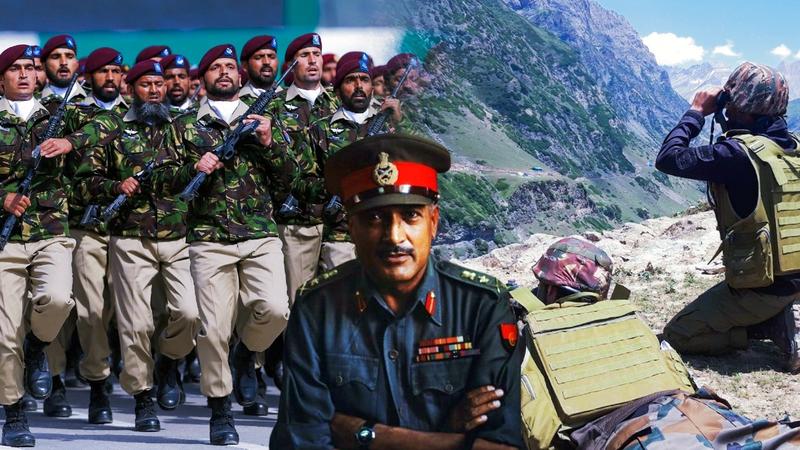Published 17:10 IST, October 29th 2024
Operation Grand Slam: Why Pakistan Had an Evil Eye on Akhnoor in 1965 and How Indian Army Foiled It
In 1965, Pakistan launched Operation Grand Slam to capture the strategically critical town of Akhnoor in Jammu and Kashmir.

New Delhi, India- This report examines the Pakistan Army's Operation Grand Slam launched in 1965 and its implications on the Indian defence framework. The operation was aimed at seizing Akhnoor in Jammu and Kashmir, a critical town with strategic value for both military logistics and geographical leverage. Through an analysis of the Indian Army’s strategic tactics that thwarted the operation, the study explores why Pakistan continues to view Akhnoor as a vital target and discusses potential measures for securing the region. The research also identifies and compares an Indian military strategy that is equivalent to Operation Grand Slam.

Operation Grand Slam was a Pakistani military operation launched on September 1, 1965, during the Indo-Pakistani War. Its primary objective was to capture the strategically critical town of Akhnoor, located in the Jammu region near the ceasefire line (now the Line of Control or LOC). Pakistan anticipated that seizing Akhnoor would sever the logistical connections between the Indian forces stationed in Jammu and Kashmir and their supply lines, effectively destabilizing the Indian presence in the region. Akhnoor's capture would not only disrupt the Indian Army's defensive stance in Jammu but also open up potential corridors for a larger invasion into Kashmir.
The operation began with a high-intensity attack involving Pakistani armour and infantry units. Pakistan expected a swift victory, driven by the momentum gained from their infiltration efforts (Operation Gibraltar) in the preceding months. However, despite initial advances, the operation faced significant resistance and was ultimately thwarted due to the Indian Army's strategic countermoves.
How did the Indian Army's Strategic Tactics Foiled the Operation?
The Indian Army's strategic counteractions played a decisive role in thwarting Operation Grand Slam. Although Pakistan made early inroads, a combination of Indian tactical resilience and calculated strategic responses disrupted Pakistan’s momentum. The following key tactics contributed to Pakistan's failure:
- Rapid Mobilization and Reinforcement: When Pakistan's forces launched the operation, the Indian Army quickly mobilized reinforcements, especially from the 191st Infantry Brigade, which played a crucial role in resisting Pakistani advances. This reinforced line of defence slowed Pakistan’s armoured units, giving Indian forces the time needed to establish stronger defensive positions.
- Counter-Offensive Strategy: To relieve pressure on Akhnoor, Indian forces launched a counter-offensive on Pakistan’s southern front, opening a new theatre of war in Punjab . This forced Pakistan to divert troops and resources, creating logistical challenges and reducing the operational strength of Pakistani units at Akhnoor.
- Leadership Change and Pakistani Missteps: A significant turning point was Pakistan's abrupt change in leadership mid-operation. General Akhtar Hussain Malik was replaced by General Yahya Khan. This shift disrupted command cohesion and led to tactical misjudgments, which Indian forces capitalized on by launching precision strikes to hamper Pakistani supply lines and reinforcements.

Ultimately, India’s ability to mount a rapid and effective defensive response, combined with Pakistan’s operational mismanagement, led to the abortion of Operation Grand Slam.
Why Pakistan Eyes Akhnoor as a Target in Jammu and Kashmir?

Akhnoor’s location near the LOC and its connectivity to crucial military supply routes makes it a highly strategic target. Pakistan views Akhnoor as a linchpin for several reasons:
- Geographical Advantage: Akhnoor’s proximity to the LOC means that controlling it would provide Pakistan with a tactical advantage in infiltrating the Jammu region. This would grant Pakistan a stronger foothold in the region and potential leverage over critical areas in Jammu and Kashmir.
- Logistical Control: Akhnoor is a key transit point that connects the Jammu region to the Kashmir Valley and Ladakh. By capturing Akhnoor, Pakistan aims to disrupt the Indian Army’s supply chains, potentially isolating Indian troops stationed further north in Jammu and Kashmir.
- Psychological Impact: Controlling Akhnoor would serve as a significant psychological victory, demonstrating Pakistan’s military prowess over a strategically important location. This would not only demoralize Indian forces but could also embolden Pakistan to initiate further incursions into the Jammu and Kashmir region.
How Can India Ensure the Security of Akhnoor?

Given Akhnoor's strategic importance, India must implement a comprehensive defence strategy to secure the region against potential threats. Key measures include:
- Enhanced Surveillance and Intelligence Gathering: Establishing a robust surveillance network, including the use of drones, radar systems, and satellite imagery, will ensure real-time intelligence on any hostile movements near Akhnoor. Reliable intelligence enables preemptive strikes and rapid defensive positioning.
- Fortified Defense Infrastructure: Strengthening Akhnoor’s defensive infrastructure, such as bunkers, anti-tank fortifications, and secured supply routes, can enhance the Indian Army’s readiness. Advanced military engineering solutions can transform Akhnoor into a fortified defensive position.
- Increased Military Presence and Quick Reaction Teams: Deploying additional troops along with armoured divisions in and around Akhnoor will enable rapid deployment in case of an incursion. Quick Reaction Teams (QRTs) stationed at key points can ensure rapid containment and neutralization of any sudden threats.
- Public Engagement and Local Support: Engaging local communities to report suspicious activities and providing them with resources for evacuation in emergencies can build a resilient local support network that aids security forces.
Updated 17:14 IST, October 29th 2024




